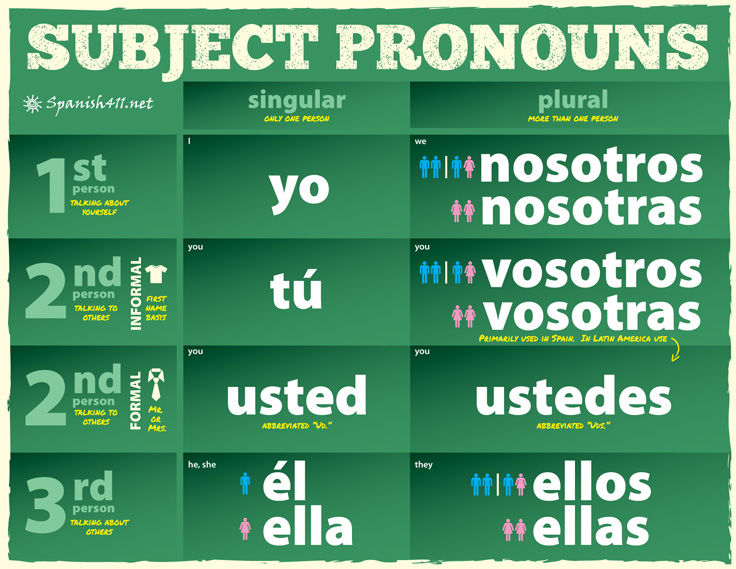|
|||||||||||||||||||||||||||||||||||||||||||||||||||||||||||||||||||||||||||||||||||||
 |
|||||||||||||||||||||||||||||||||||||||||||||||||||||||||||||||||||||||||||||||||||||
 |
|||||||||||||||||||||||||||||||||||||||||||||||||||||||||||||||||||||||||||||||||||||
Subject Pronouns in Spanish
Getting StartedWhat Is a Subject?Generally speaking, a subject is who or what a sentence is about. Nearly anything can be a subject. In the sentences below the subjects are underlined: Nicolas Cage is an actor. Subjects usually come at the beginning of a sentence but they don’t have to. What Is a Subject Pronoun?A pronoun is a shorter word that takes the place of a longer noun. We use pronouns once we’ve introduced a noun so that we don’t have to keep repeating the same thing over and over again. Here are some sentences where the subjects have been replaced with subject pronouns. He is an actor. The subject pronouns in English are “I,” “you,” “he,” she,” “it,” “we,” and “they.” It can be beneficial to organize them into a chart based on number (how many people or things there are) and person (whether you’re talking about yourself, to someone else, or about someone else).
Notice that there is no distinction in English between the singular “you” and the plural “you.” While it’s not considered proper grammar, many people will use “y’all” or “you guys” to indicate that they’re speaking to more than one person. It’s also worth noting that “he” and “she” are the only pronouns that take gender into account. Spanish Subject PronounsThe subject pronoun chart in Spanish looks like this:
Note there is no subject pronoun for “it” in Spanish. How do you say “it”? See below. YoTo say “I” in Spanish, say yo. Yo is not capitalized unless it starts a sentence: Yo hablo español. Afortunadamente yo hablo español. In many regions the “y” in yo is pronounced very strongly and sounds more like a “j.” TúTo say “you” in Spanish, say tú. Tú can only be singular; you cannot use tú to address a group of people. Also, the accent on the “u” is not optional; tu (without the accent) means “your” not “you.” (The words tú and tu are pronounced the same way.) Tú hablas español. Él, EllaTo say “he” in Spanish, say él. As with tú, the accent on the is not optional; el (without the accent) means “the” not “he.” (The words él and el are pronounced the same way.) To say “she” in Spanish, say ella. Remember that the “ll” is pronounced like a “y.” Él habla español. Ella habla español. Nosotros, NosotrasNote: If you are male, it’s very unlikely you would ever have reason to say or write nosotras. Usually when you need to say “we” in Spanish, you say nosotros. The exception is when a female is referring to herself and other females. She will say nosotras. What about a mixed group? It’s not very nice or politically correct but only groups consisting entirely of females are considered feminine (nosotras). Add one male to the group and whole group is considered masculine (nosotros). Nosotros hablamos español. Nosotras hablamos español. Vosotros, VosotrasUnlike English, Spanish does have a way to distinguish between a singular “you” and a plural “you.” To address a group of people as “you,” use vosotros. Vosotros habláis español. If the entire group you’re addressing is female, say vosotras instead. Vosotras habláis español. Regardless of the size of the group, if it includes just one male, use vosotros. If you’re ever in doubt, use the masculine form. Here’s the catch, and it’s a big one: Vosotros is used almost exclusively in Spain. So how do you address a group of people if you’re not in Spain? See Vosotros and Ustedes below. Ellos, EllasTo say “they” in Spanish, you say either ellos or ellas. Which is which? The same gender rules you learned in nosotros apply. A group consisting entirely of females should be referred to as ellas. Any group with at least one male in it should be referred to as ellos. If you’re ever in doubt, it’s best to use the masculine form. Ellos hablan español. Ellas hablan español. Formal vs. Informal “You”The chart above showing tú and vosotros as the second-person pronouns is a bit of an oversimplification. The truth is that there are two sets of second-person pronouns in Spanish. One set is used for informal, friendly situations and the other is used to show a greater amount of respect in formal situations. The chart should really look like this:
So which do you use when? Tú or Usted?Generally speaking you should use tú when you are addressing someone with whom you have an informal relationship like a friend, a colleague, or a close family member. Use usted when addressing someone with whom you have a more respectful relationship like an elder, a boss, or a dignitary. For example:
A good rule of thumb to use is the first name test. If you’re on a first name basis with someone, you may address them as tú. If you wouldn’t address that person by their first name, you should probably use usted. Note: There’s even a verb for addressing someone as tú: tutear. Different countries have different rules for using tú vs. usted. While some people might consider your use of tú endearing, others may consider it offensive. When in doubt, use usted. You’re better off addressing someone as usted when they’re expecting tú than the other way around. The word usted is commonly abbreviated Ud. (note the capital letter). Vosotros or Ustedes?When addressing a group of people, vosotros is used for informal situations and ustedes is used in situations where more respect is necessary. For example:
Remember, however, that vosotros is primarily used in Spain. How do you address groups of people in the rest of the Spanish-speaking world? Use ustedes regardless of the level of formality.
The word ustedes is commonly abbreviated Uds. (note the capital letter). Thou and TheeIf all this formal/informal stuff seems needlessly complicated, it wasn’t that long ago that English did the same thing:
“Thou” may sound stuffy and formal now, but it used to be the informal version of “you.” Saying “you” was actually a sign of respect. Older translations of the Bible are full of “thou,” “thee,” and “thy” not because of formality, but in order to stress that God was familiar and approachable. Nowadays Spanish versions of the Bible use tú when translating references to God for the same reason. More about Spanish Subject PronounsWhat about “It”?“It” is a subject pronoun in English used to refer to something that doesn’t have a gender or whose gender isn’t known. There is no equivalent subject pronoun in Spanish. So how do you say “it” in Spanish? You don’t. You simply omit the subject pronoun altogether: Es bonita. Funciona bien. Omitting Subject PronounsSpeaking of omitting pronouns … Because many verb conjugations make it clear who the subject is anyway, subject pronouns are often unnecessary and frequently omitted in Spanish. For example: Hablas español. Hablamos español. VosIf tú vs. usted wasn’t complicated enough, some regions of the Spanish-speaking world have a third category, vos. Generally speaking vos indicates an even closer relationship than tú.
Read more about vos here: What is the Deal with Vos (Voseo)? |
|||||||||||||||||||||||||||||||||||||||||||||||||||||||||||||||||||||||||||||||||||||
 This work by Spanish411.net is licensed under a Creative Commons Attribution-NonCommercial-ShareAlike 4.0 International License. This work by Spanish411.net is licensed under a Creative Commons Attribution-NonCommercial-ShareAlike 4.0 International License. |



